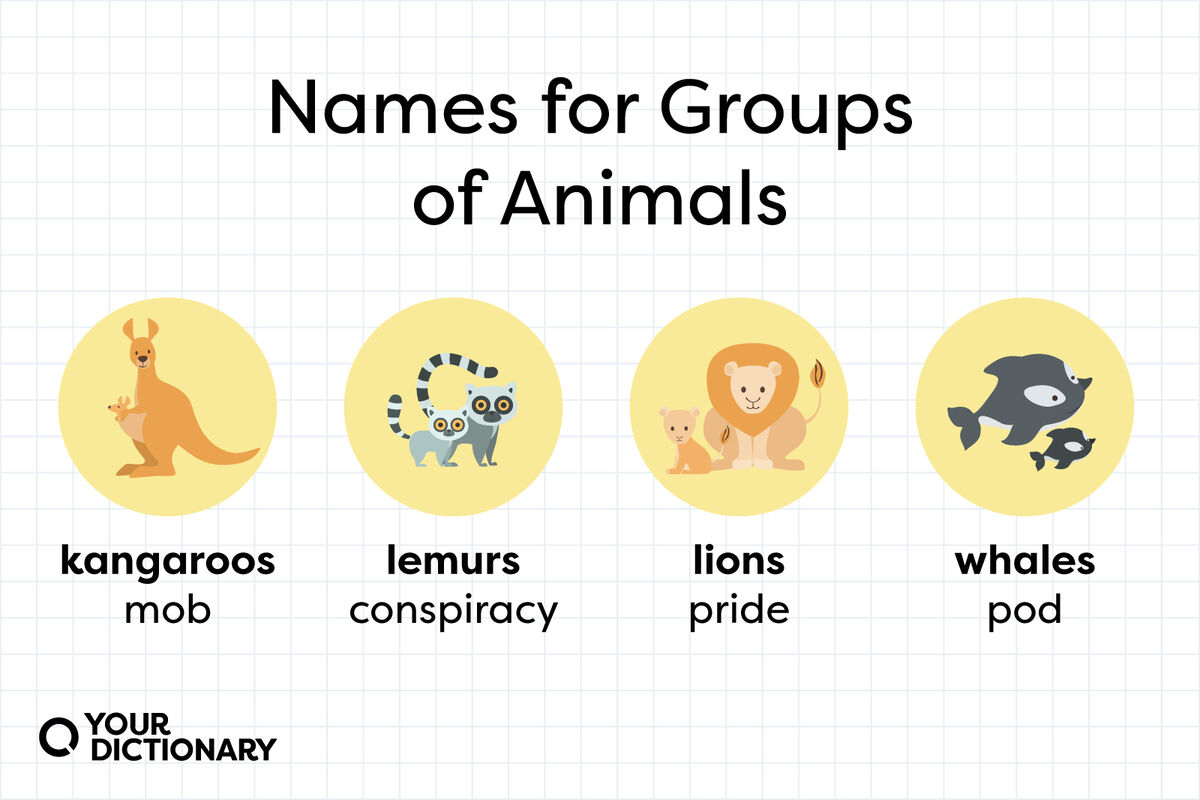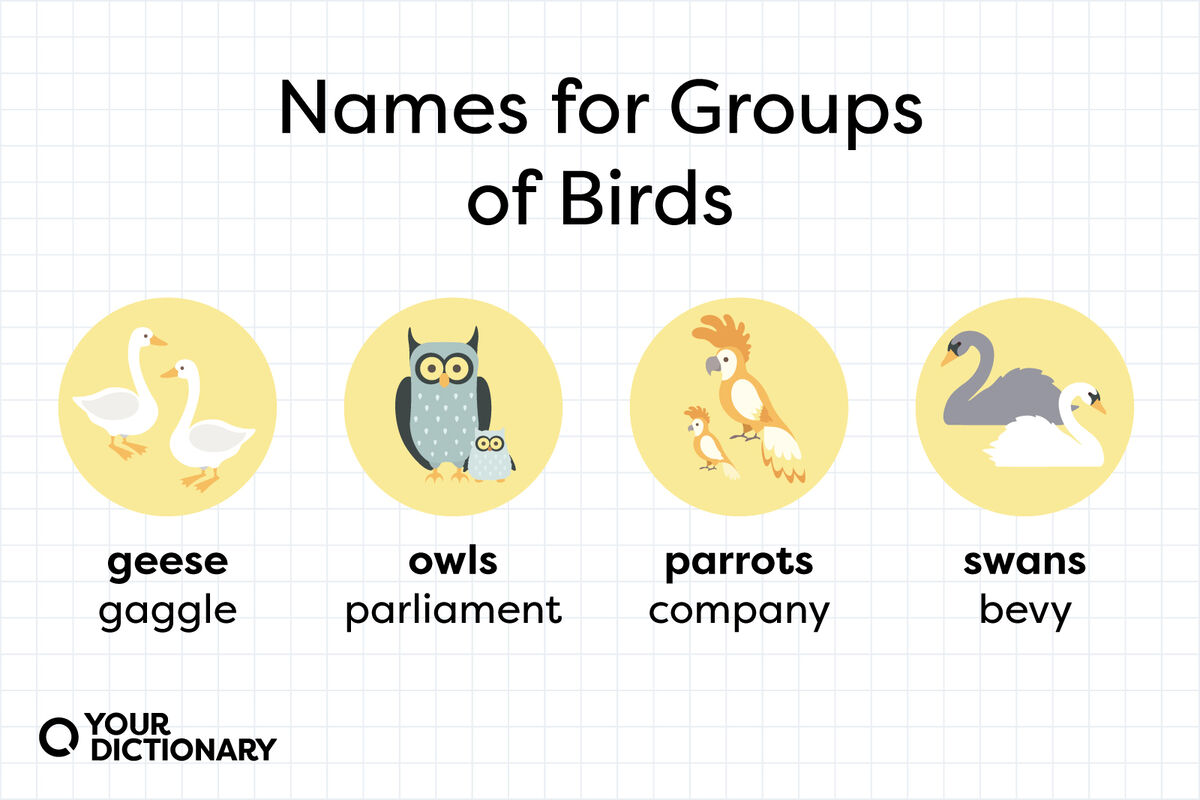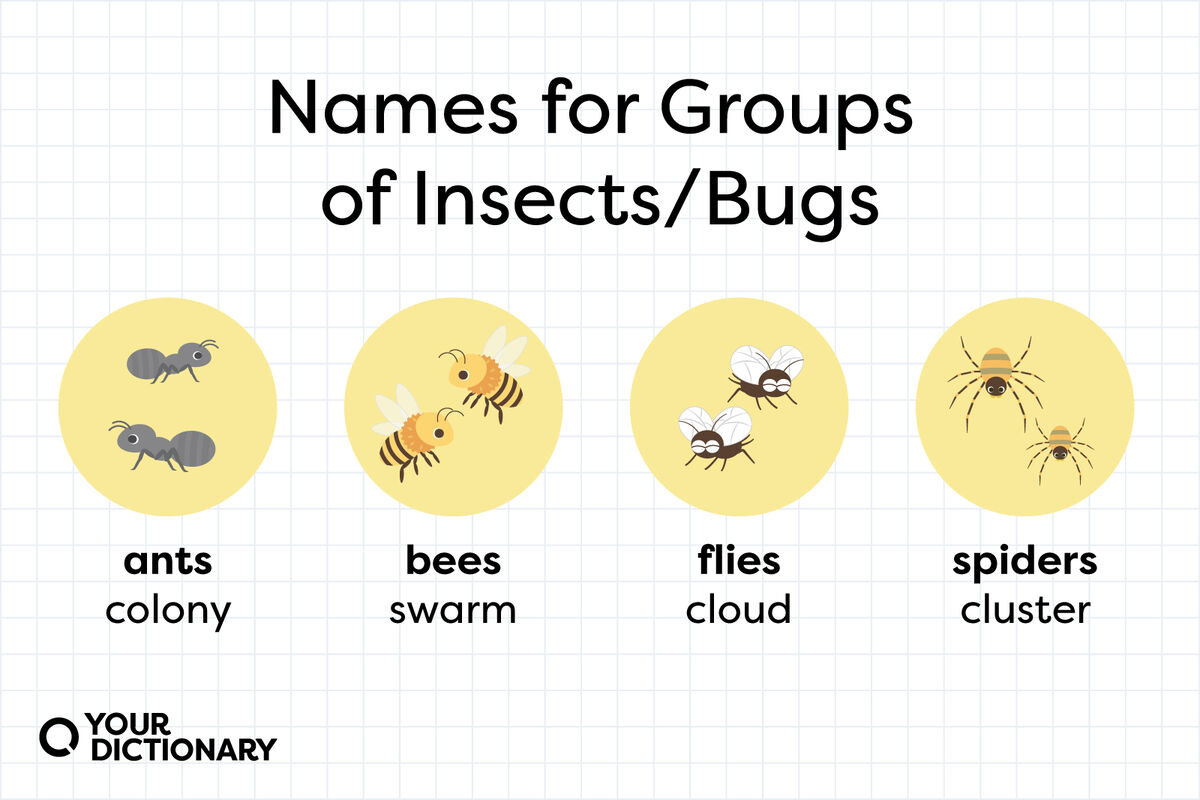
Sometimes you look at a group of animals, and you’re not really sure what to refer to them as collectively. While you are within your rights to refer to them as “a bunch of guys,” animal species all have their own collective group names. While there isn’t an official committee that says it’s a murder of crows or a crash of rhinos, it’s still worth knowing these different animal group names for your writing and personal knowledge.
Collective Nouns for Mammals
Noted for their fur (or hair) and ability to produce milk to feed their young, mammals come in all shapes and sizes.
If you see some of them in a group, they might be referred to as a gang or a pack. However, if you’re in doubt, you can always stick with herd or group.
For animals with multiple potential group names, we’ve bolded the most common that you might encounter.
|
Mammal |
Animal Group Names |
|
apes |
shrewdness |
|
badgers |
cete |
|
bats |
colony, camp, cloud (in flight) |
|
bears |
sleuth, sloth |
|
camels |
caravan, train, scorn |
|
cats |
clowder |
|
dogs |
pack |
|
donkeys |
drove |
|
elephants |
parade |
|
elk |
gang |
|
ferrets |
business, fesnyng |
|
foxes |
skulk |
|
giraffes |
tower |
|
gorillas |
troop |
|
hippopotami |
pod, bloat |
|
horses |
team, harras |
|
hyenas |
clan, cackle |
|
kangaroos |
mob, troop, court |
|
lemurs |
conspiracy |
|
leopards |
leap, prowl |
|
lions |
pride |
|
moles |
labor, company, movement |
|
monkeys |
troop, barrel |
|
otters |
bevy, family, romp, raft (when floating together) |
|
oxen |
team, yoke |
|
pigs |
drift, drove |
|
porcupines |
prickle |
|
rabbits |
colony, fluffle |
|
rats |
pack, colony, swarm, mischief |
|
rhinoceroses |
crash |
|
skunks |
surfeit |
|
squirrels |
scurry, dray |
|
tigers |
ambush, streak |
|
whales |
pod, gam |
|
wolves |
pack |
|
zebras |
dazzle, zeal |
Spotlight: A Pride of Lions
It’s hard to say if lions are actually proud or what that even means to them, but pride was actually a pretty archaic term for a social unit of lions (back when they were spelled lyons). It wasn’t until the early 20th century that the term gained popularity. Prior to that, you were just as likely to refer to them as a group, herd, or pack.
Names for Groups of Birds
Birds — most of them can fly, some of them can’t, but they’re all noted for their feathers, beaks, and laying of eggs. As with mammals, birds come in all forms, leading to a delightfully poetic sampling of collective nouns, from convocations to murders.
However, if you ever see a bunch of birds and can’t identify the species, you can always refer to them as a flock without much issue.

|
Bird |
Collective Noun |
|
crow |
murder, mob |
|
doves |
dule |
|
eagles |
convocation, soar |
|
falcons |
cast, kettle, bazaar |
|
flamingos |
flamboyance, stand, colony |
|
geese |
gaggle |
|
herons |
sedge, siege |
|
owls |
parliament, congress, wisdom |
|
parrots |
pandemonium, company |
|
ravens |
unkindness, conspiracy |
|
starlings |
murmuration |
|
swans |
bevy, wedge (in flight) |
|
turkeys |
rafter, gang |
|
turtle doves |
pitying |
Spotlight: A Murder of Crows
So a murder of crows is one of the coolest (or at least memorable) animal group names. The exact origin isn’t well known, though it might allude to the crow’s association with death.
What’s interesting: Despite being a memorable term of venery, it’s not actually used much. Throughout most of English language literature, flock of crows far outweighed murder of crows, and until about the ‘90s, even group of crows was used more frequently than murder of crows.
Collective Nouns for Aquatic and Amphibious Creatures
Over 70 percent of the world is covered in water, so you can imagine that it’s home to a ton of different species. Not all of those creatures are particularly social or hang out in groups, but for those that do, you’re treated to schools and fevers.
|
Animal |
Animal Group Names |
|
fish |
school, shoal |
|
frogs |
army |
|
jellyfish |
smack |
|
sea stars |
galaxy |
|
sharks |
shiver, frenzy |
|
stingrays |
fever |
|
toads |
knot |
Spotlight: A School of Fish
No evidence suggests that fish are particularly studious, so why is it a school of fish? School here comes from schōle, the Dutch word referring to “a group, troop, or band.” That’s also where you get the word shoal, an alternate collective noun for fish.
Names for Groups of Insects and Bugs
Insects, bugs, those many-legged creatures — they’re all around us. Some estimates suggest that there are 1.4 billion insects for every single human on the planet. That’s a lot of legs and thoraxes! And with that comes plenty of collective nouns for each of those exoskeletal creatures, from armies to clouds.
If you’re not sure, you can usually refer to a large collection of a bug species as a swarm (for large groups of flying insects) or colony.

|
Insect/Bug |
Collective Noun |
|
ants |
colony, army |
|
bees |
swarm |
|
butterflies |
kaleidoscope, flutter |
|
caterpillars |
army |
|
cockroaches |
intrusion |
|
dragonflies |
flight, cluster |
|
flies |
cloud |
|
grasshoppers |
cluster, cloud |
|
hornets |
nest, bike |
|
ladybugs |
loveliness |
|
locusts |
plague |
|
mosquitoes |
scourge |
|
moths |
eclipse |
|
scorpions |
nest, bed |
|
spiders |
cluster, clutter |
|
termites |
brood |
What Are Terms of Venery?
Terms of venery is the more official phrase for what we know as collective nouns, nouns of assembly, or names for groups of animals. In its archaic form, venery is a noun that means “the sport or act of hunting game beasts; the chase.” This comes from the Medieval Latin word venaria, meaning “beasts of the chase, game.”
Thus, terms of venery referred to groups of specific game animals. That eventually expanded to include creatures that weren’t hunted (like bugs), and usage that spread beyond just hunters.
How To Use Collective Animal Names
Just to reiterate: Animal group names aren’t official. Much like the rest of human language, these terms of venery come from literature, culture, and (in some cases) random happenstance. Over time, certain populations picked those words up and ran with them.
You should by all means use these collective words to enhance your writing or add a neat flourish to your poetry, but avoid using them as some sort of official scientific designation or (worse) to correct people. Nobody likes a know-it-all, especially when you’re not actually 100% right.